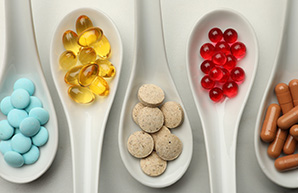With age, your body starts to slow down, and your nutritional needs can increase. You may also have trouble chewing, diminished appetite, lack of motivation to cook and medical issues that affect absorption of nutrients. All this makes it important to check with your health provider that you’re getting all you need – or whether supplementation may help, says registered dietician and ADSA spokesperson Estee van Lingen.
Don’t just start taking supplements without medical advice – too much of some nutrients can pose health risks. High doses of vitamin E, for example, may cause bleeding in the brain and a stroke, extra calcium and vitamin D may raise the risk of kidney stones, and high doses of vitamin B6 for a year or longer has been associated with nerve damage, per NIH.
These are among the supplements most used for ageing, and worth discussing with your health provider:
1. Calcium
Why: You gut absorbs less of this as you get older, note authorities like Harvard School of Public Health, which can lead to weak bones and raised risk of fracture.
Food sources: Dairy, broccoli, kale, tofu and salmon. “Even higher sources than salmon – and more affordable ones – are sardines and pilchards, including the bones,” says Van Lingen.
Possible supplements: Clicks Calcium Forte or Clicks Essentials Calcium Complete
2. Vitamin D
Why: Lack of calcium is often related to a deficiency in vitamin D, needed for its absorption. Vitamin D is most available from direct sunlight, and as you age you may not get out as much.
Food sources: Fatty fish, eggs, liver, yoghurt, cheese, fortified milk.
Possible supplements: Clicks Essentials Vitamin D3, Wellvita Vitamin D3 or GNC Vitamin A&D
3. Vitamin B12
Why: Your body naturally absorbs less of this from food as you get older due to a reduction in stomach acid, says Van Lingen. A study in Applied Physiology, Nutrition and Metabolism suggests up to 43% of older adults could be deficient, and those in long-term care homes may be at greater risk.
Food sources: Meat, fish, eggs and dairy.
Possible supplements: Clicks Essentials Vitamin B12 or Clicks Expert Vitamin B12
4. Magnesium and zinc
Maintaining the right magnesium balance may help prevent oxidative stress and chronic conditions associated with ageing, according to a study in the 2021 journal Nutrients. Some evidence suggests these minerals can help with relaxation and sleep, and a 2016 study found taking magnesium may help reduce physical and mental stress. “Magnesium also assists with muscle contractions and can help prevent muscle cramps,” says Van Lingen.
Sources of magnnesium: Brazil nuts, leafy greens, seeds, whole grains and legumes.
Sources of zinc: red meat, shellfish, nuts, seeds, whole grains, fortified cereals and chocolate.
Possible supplements: Ultimag Advanced Zinc and Magnesium
IMAGE CREDIT: 123rf.com

